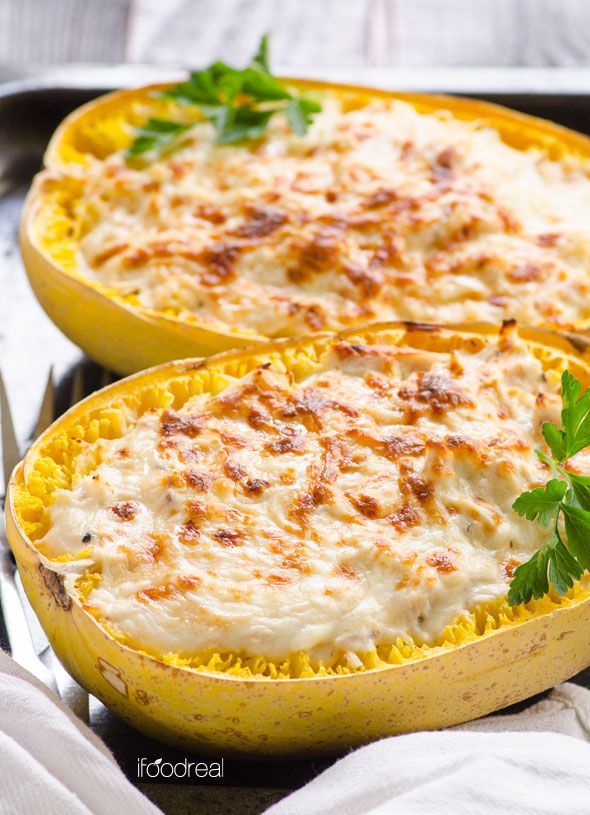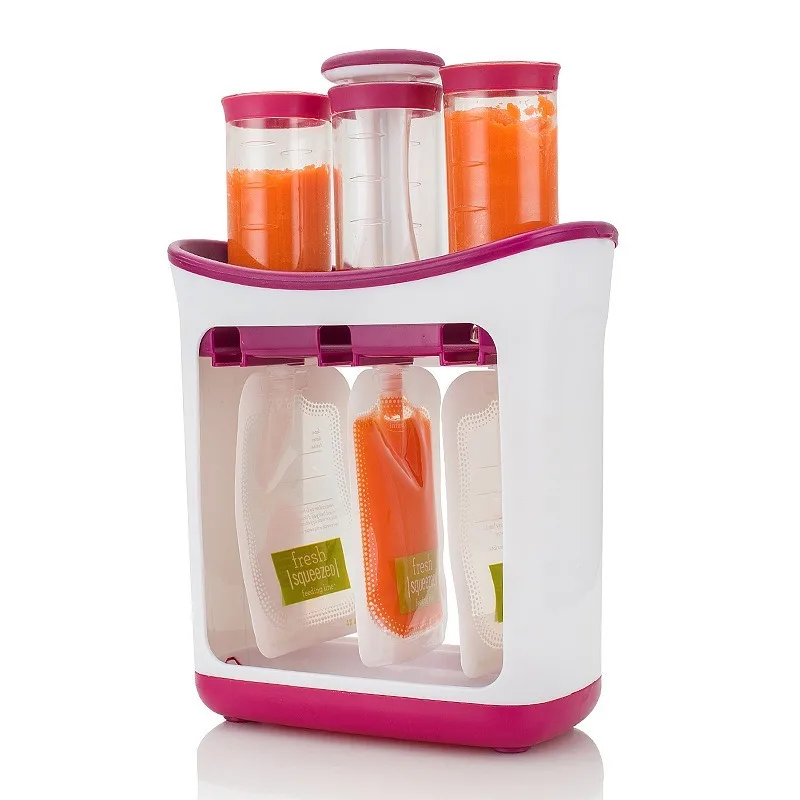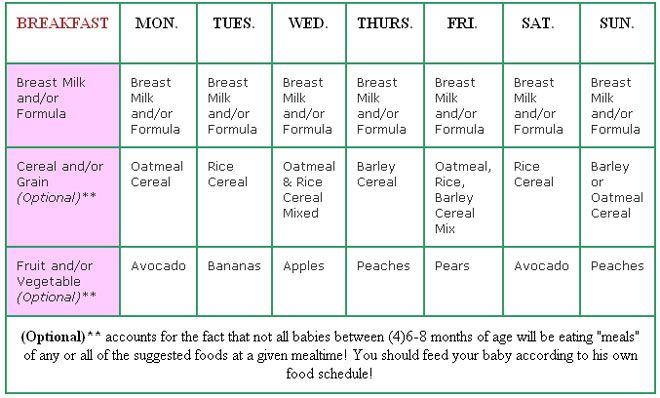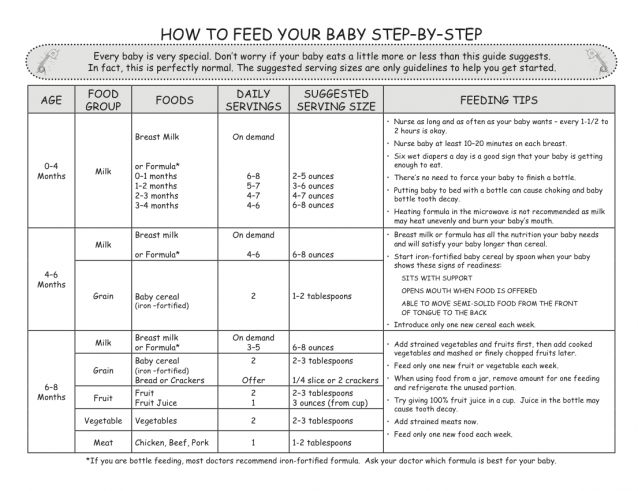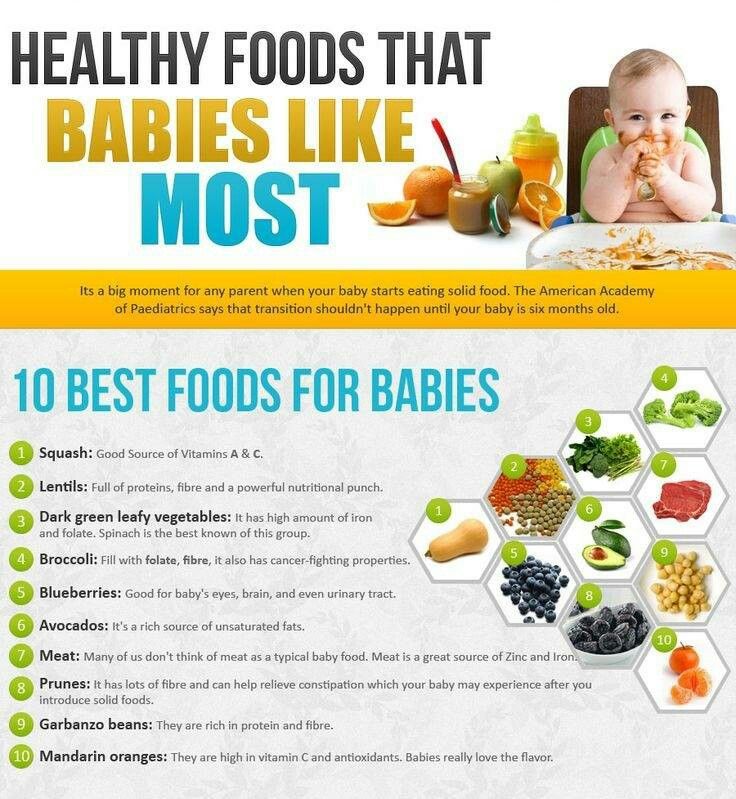Feed your babies onions
Benefits, Age, for Colic, and More
So many delicious foods start with a bit of onion. Casseroles, tacos, salsa, soups — onions are in everything! With all the tasty concoctions you can make with this classic ingredient, you may be especially eager to introduce onions to your favorite little person: your baby.
The when and how of feeding your child solids can sometimes feel confusing or overwhelming. Fortunately, starting your baby on onion is relatively simple. We’ve got the details on including this aromatic veggie in your little one’s diet.
With their firm texture and strong taste, onions may not be a top contender for your child’s very first solid food — but, according to the American Academy of Pediatrics (AAP), there’s no perfect order in which to introduce various types of solids.
“Onions can be safely given to babies as they begin solid foods, starting around 6 months old,” confirms pediatric dietitian Grace Shea, MS, RDN, CSP.
According to the AAP, signs of readiness for solid foods include:
- holding their head up
- moving food from a spoon into their throat
- opening their mouth as food approaches
- doubling birth weight to around 13 pounds
When your child displays these indicators, you can consider giving them their first taste of cooked onions.
Onions are a healthy food for people of all ages — and that includes babies!
“Onions are packed with nutrients beneficial for babies, like fiber and prebiotics, which support digestion,” says Shea. One small onion contains about 1 gram of fiber. This may not sound like much — until you consider that babies only require about 5 grams of this nutrient per day.
Additionally, onions are a significant source of vitamin C at 5 milligrams (mg) per small onion. (This is about 10 percent of the recommended daily intake of 50 mg for infants 7 to 12 months.) Getting enough vitamin C can help your child’s body create collagen, combat damaging free radicals, and maintain immunity.
In smaller amounts, onions also provide folate, vitamin B6, and potassium.
We know your baby isn’t going to eat even one small onion daily. But besides their nutrition benefits, onions offer the perk of adding flavor to baby’s food without sodium or anything artificial.
It’s a rare breed of person — whether infant or adult — who enjoys eating onions raw.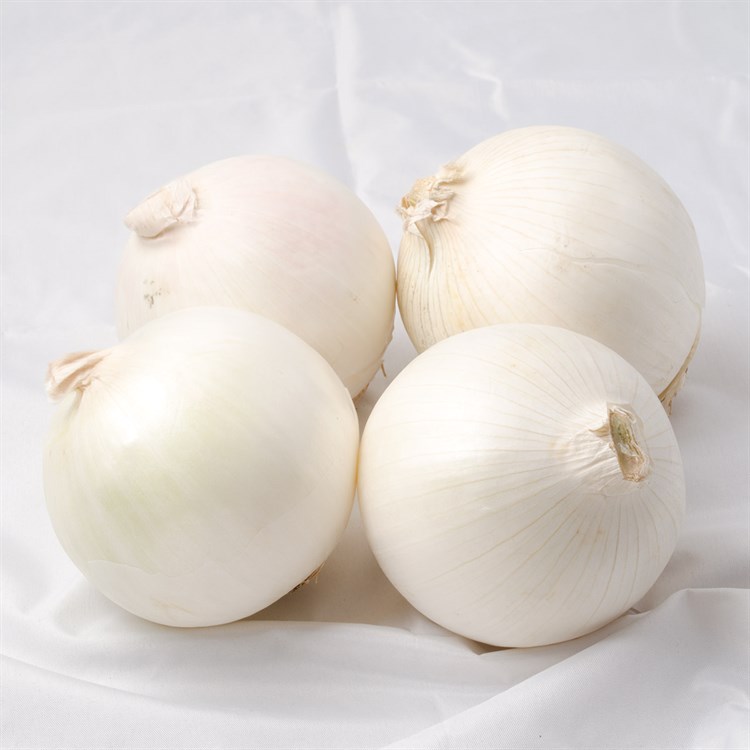 Just like you probably don’t chow down on a Vidalia like an apple, your baby isn’t likely to gravitate toward the taste and texture of raw onions.
Just like you probably don’t chow down on a Vidalia like an apple, your baby isn’t likely to gravitate toward the taste and texture of raw onions.
When introducing onions, start by including them in a cooked dish, such as a purée with other veggies. You can also consider meatballs, casseroles, or an omelet if your baby is accustomed to solids already.
If you choose to feed your child onions on their own, it’s important to serve them cooked and cut into small pieces. According to the Centers for Disease Control and Prevention, pieces of hard raw vegetables remain a choking hazard until babies reach 12 months of age.
To bring out onions’ natural sweetness — which may increase the chances of your child enjoying them — try roasting or pan-sautéing them in a bit of olive oil.
Leave it to the internet to come up with off-the-wall uses for onion. One rumored remedy for colic in babies is to boil an onion in water, then put the cooled, pungent “tea” in baby’s bottle.
If this sounds too good to be true, it probably is.
“Although onion water and onion tea have been touted as a curative for colic and upset tummy in babies, there’s no scientific evidence to support their effectiveness,” says Shea.
Plus, infants and any kind of “tea” shouldn’t mix. “Babies under the age of 1 shouldn’t be given fluids other than breast milk or formula,” Shea notes.
Ah, teething — that challenging time when your little one is extra fussy and drooling like a fire hose.
Similar to the advice you may read about onions and colic, you may hear onions touted as a solution for babies’ teething woes. Give your little one a bit of frozen green onion (or even raw white onion) to gnaw on, say proponents, and watch their fussiness disappear.
So are onions a legit teething remedy? It’s possible your child may enjoy the soothing sensation of anything frozen when teething, but tales of onions as a curative for gum pain are anecdotal at best.
However, it’s certainly not wrong to give your child onions while teething.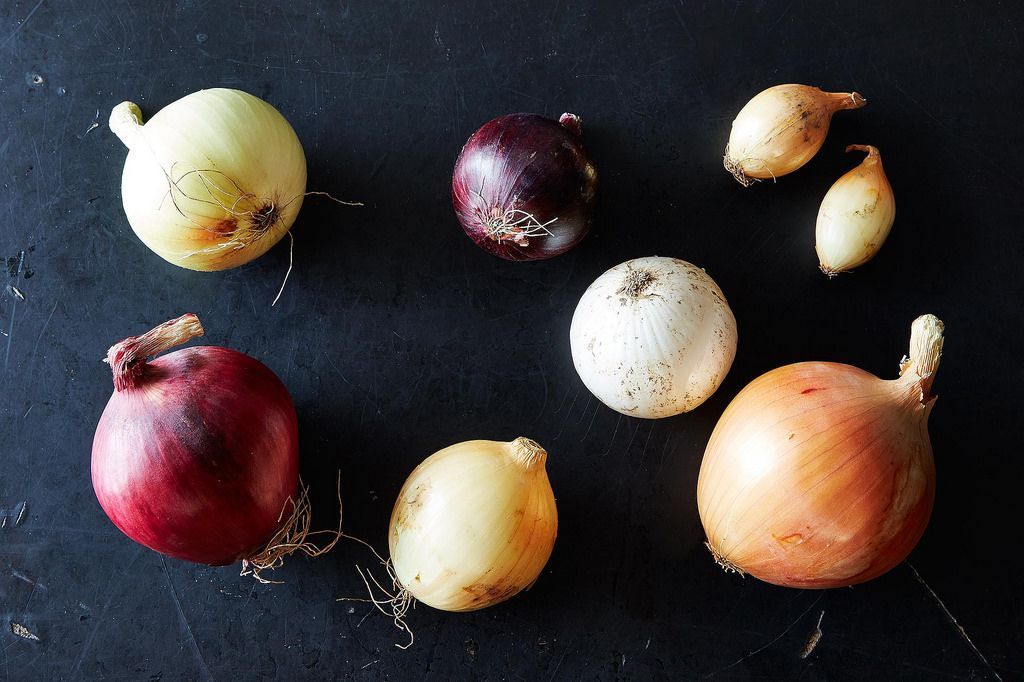 “Onions are safe to feed babies when they’re teething, and parents can mix cooked onions into foods as they normally do,” says Shea.
“Onions are safe to feed babies when they’re teething, and parents can mix cooked onions into foods as they normally do,” says Shea.
“Babies’ appetites and the amount of food they normally eat is typically lower during teething times, so parents shouldn’t be surprised if their baby doesn’t want onions from time to time.”
Other than onions’ strong flavor, you may wonder if you should hold off on feeding them to your child for other reasons, such as food allergies.
“Onions aren’t considered a common food allergen; however, babies can be allergic to any food,” says Shea. “When introducing onion, start by offering a small amount for their first couple of introductions, watching closely for adverse reactions.”
There’s one other potential pitfall of feeding your baby onions: gas. Fortunately, a simple fix can reduce the likelihood of your little one tooting up a storm after a dinner of onion soup. “Serving cooked onions, rather than raw, may be easier on digestion, as well as more palatable to babies,” says Shea.![]()
With their savory, aromatic flavor and tons of health benefits, onions can be a healthy, tasty addition to your baby’s diet.
To prevent gas and reduce choking risks, just be sure to serve them cooked — not raw — and in small pieces.
And don’t worry if your littlest eater turns up their nose at onions the first few times. The more you experiment with offering onions in various packages, the better the chances you’ll soon get a smile (and a bit of baby onion breath) upon serving these veggies.
Uses, Benefits, Right Age And Recipes
The vegetable contains several nutrients and adds texture, taste, and flavor to your baby's food.
Research-backed
MomJunction believes in providing reliable, research-backed information to you. As per our strong editorial policy requirements, we base our health articles on references (citations) taken from authority sites, international journals, and research studies. However, if you find any incongruencies, feel free to write to us.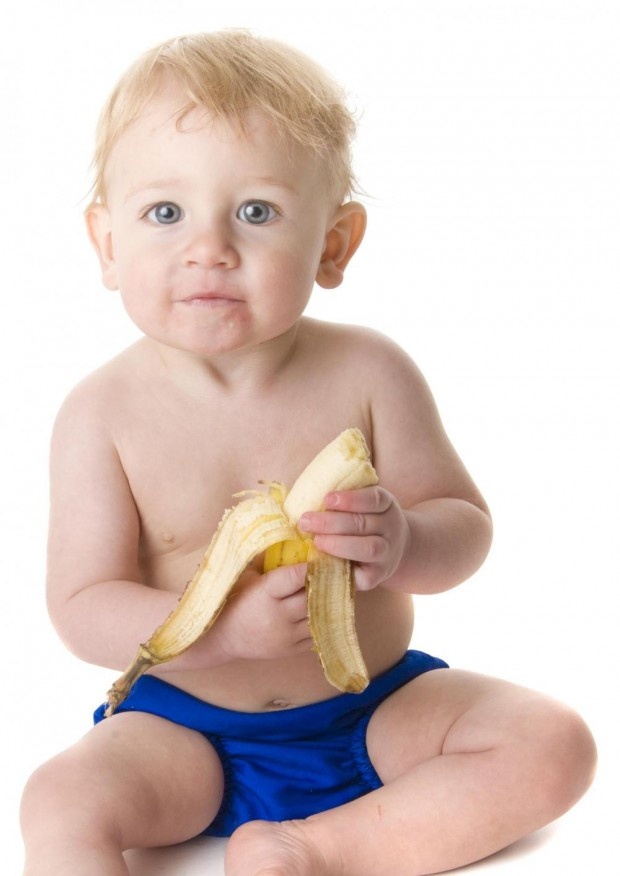
Image: Shutterstock
Onion is a common vegetable used worldwide in raw, cooked, and fermented forms. While eating this veggie is generally safe, the safety of onion for babies can be determined only by knowing the right age and age-appropriate ways to feed it to them.
Generally, onions come in different varieties and are classified based on skin color (white, yellow, red, or brown), shape (round, globe, or flat), and taste (pungent or sweet) (1). Specific onion varieties are chosen to add aroma, flavor, and texture to food. Besides, onions can provide certain phytochemicals that may impart lasting benefits to overall health.
Read this post to know the right age to feed onions to babies, the possible benefits it can offer, ways to feed it safely, and some interesting onion recipes for your baby.
When Can Babies Eat Onions?Babies can eat cooked onions from the age of six months (2). Introduce onions as part of the baby’s regular diet consisting of several solids.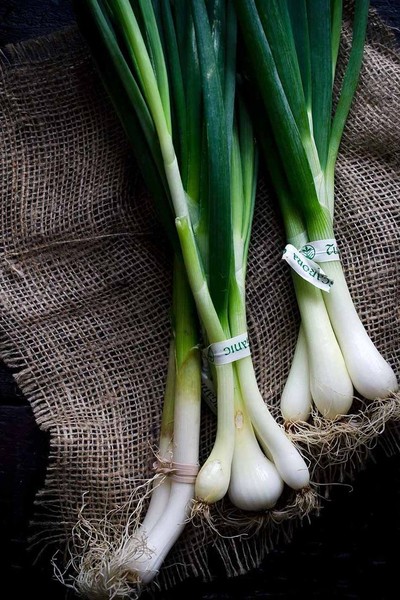 You can use cooked, mashed, or pureed onions to add flavor to different recipes, such as fruit and vegetable purees, porridges, and soups.
You can use cooked, mashed, or pureed onions to add flavor to different recipes, such as fruit and vegetable purees, porridges, and soups.
Older babies can consume cooked onion as finger foods, such as cooked onion rings. Toddlers can consume steamed, baked, grilled, and roasted onions, along with other foods. Avoid serving raw onion to babies since it could be difficult to digest and may expose the little one to germs (3). You may avoid it if your baby has a sensitive digestive system and has bloating. You may introduce raw onions after your baby attains the age of 12 months when their digestion and immunity are better.
Nutritional Value Of Onions
The nutritional value of one raw, small onion (70 g) added to a recipe can provide the following nutrients to the baby (4) (5) (6).
| Nutrients | Amount | RDA(7-12months) |
| Water | 62.4g | – |
| Energy | 28Kcal | – |
| Fiber, total dietary | 1.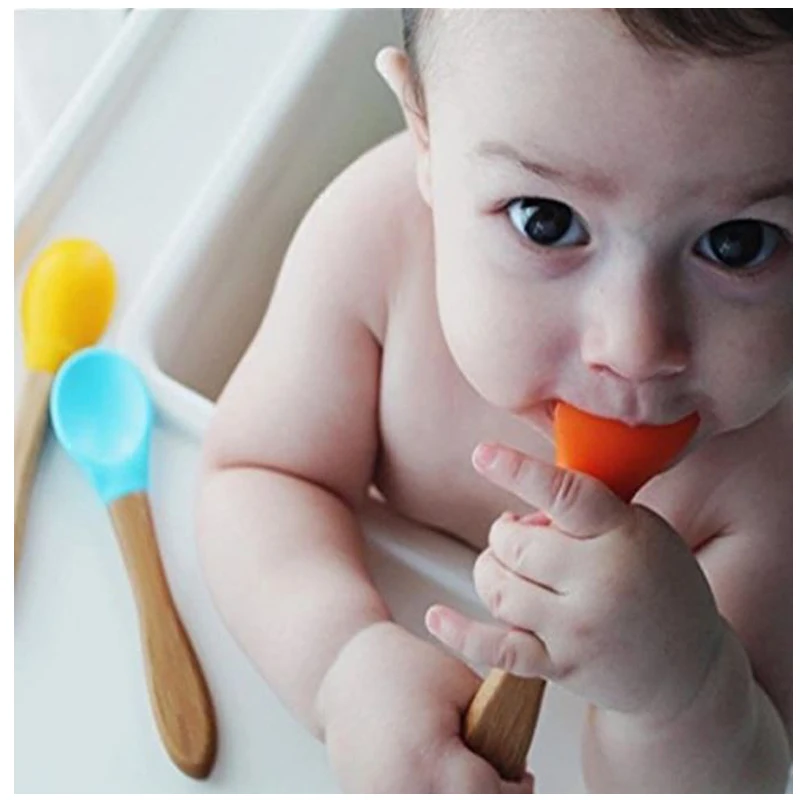 19g 19g | – |
| Potassium, K | 102mg | 700mg* |
| Folate | 13.3µg | 80AI |
| Vitamin C, total ascorbic acid | 5.18mg | 35mg |
*AI = Adequate intake – nutrient level assumed to ensure nutritional adequacy
Sources: U.S. Department of Agriculture, World Health Organization, and Oregon State University
Possible Health Benefits Of Onions For Babies
Onions are considered to have anticancer, antiplatelet, antiasthmatic, and antibiotic effects (7) (8). These possible benefits of onions are mostly attributed to its phytochemicals, such as flavonoids (9). The following are the likely benefits of onions for babies.
- Provides micronutrients: One small onion gives you essential nutrients, such as fiber, folate, vitamin C, and potassium. These nutrients could contribute to your baby’s daily nutritional needs and contribute to long-term health benefits.

- Promotes immunity: Onions are an excellent source of several bioactive and antioxidant compounds that counteract free radical damage. These compounds could also benefit the immune system in the long run (10). They are a good source of vitamin C and can prevent bacterial infections and enhance the immunity.
- Enhances gut health: Onions contain a type of carbohydrate called FODMAPs that work as prebiotics and benefit the bacteria of the colon (11). It can help promote gut health in the long run (12).
- Enhances heart health: Onions are heart-healthy and can help lower cholesterol in later life.
In the long run, onions may also benefit the overall health of the gastrointestinal tract and bones (13).
How To Select And Store Onions?
Here are some simple tips to follow while selecting and storing onions.
Tips for selecting onions
- Choose onions that are firm to touch with a tissue-thin or papery-thin
- Avoid onions with bruises, cuts, and blemishes.
 Also, they should be free of black or gray molds and any visible sprouting.
Also, they should be free of black or gray molds and any visible sprouting. - Discard onions that feel too dry or wet or soft to touch.
- Choose sweeter varieties for babies as they have sensitive tongues.
Tips for storing onions
- Store whole dry onion bulbs in a cool, dry, dark place with proper ventilation. Keep them away from sunlight and aim to maintain a temperature around 77°F (25°C).
- Store onions packed in cardboard boxes or bags at least one foot away from walls to allow air circulation.
- Do not store onions in plastic bags or airtight containers as the lack of ventilation will reduce shelf life.
- Do not store onions with foods that release moisture, such as potatoes. It will cause the onion to turn wet and spongy.
- Avoid storing whole onions in the refrigerator since they may absorb moisture and turn mushy.
- You can store peeled and cut onions in an airtight container at a cool place, such as a refrigerator, for up to a week.
 However, you may avoid this as they lose their nutritional value.
However, you may avoid this as they lose their nutritional value.
Precautions To Take While Feeding Onion To Babies
Here are some necessary precautions to ensure the safe consumption of onions in babies.
- Introduce onion to your baby as cooked onion puree or mash added to different foods, such as soups, stews, cereals, and porridge in small quantities.
- You can begin by adding a teaspoon to the food and gradually increasing it to a tablespoon or two based on the recipe’s requirement.
- Once the baby seems comfortable with the onion’s taste and digestibility, gradually include baked, grilled, and roasted onions to different baby food
- Onion allergy is uncommon but possible. Its symptoms may come up immediately after touching or ingesting onion. Stay alert to its signs, like skin rash (hives) anywhere on the body, cough and wheezing, vomiting, and diarrhea (14).
- If the baby has a family history of allergies, especially to foods belonging to the lily family (garlic, leeks, shallots, asparagus, and chives) and certain pollen, then consult a doctor before adding onion to your baby’s diet.

- Babies with a sensitive digestive system may experience FODMAP intolerance after ingesting onion even in cooked form. Typical symptoms include gas, bloating, and abdominal cramps (15).
- Be alert and check the ingredient list of packaged foods, such as soups and curries, that may contain powdered onion.
- Wash peeled raw onions thoroughly under water before cooking them or when serving them raw to toddlers. Washing can help remove any germs present on the onion’s surface Take care not to wash excessively as it may cause some nutrient loss.
- Cut onions in small pieces when serving them as finger food. It helps avoid the risk of choking.
Healthy Onion Recipes For Babies And Toddlers
Below are some onion recipes you can feed to your infant or toddler.
1. Squash, carrot, and onion puree
Image: Shutterstock
You will need:
- ½ cup squash (peeled, chopped, and steamed)
- 2tbsp carrots (peeled, chopped, and steamed)
- 1tbsp yellow onion (peeled, chopped, and steamed)
How to:
- Blend all the ingredients into a lump-free, smooth paste, using a food processor or blender.

- Add water to adjust the consistency. Pour the puree into a feeding bowl and serve.
2. Onion and green pea soup
Image: Shutterstock
You will need:
- 100ml low-sodium vegetable stock
- 50g red onion (sliced)
- 30g frozen peas
- 1tsp dried thyme
- 2tbsp olive oil
How to:
- Heat olive oil in a saucepan on medium heat and saute onions for ten to 15 minutes.
- Add thyme, peas, and vegetable stock into the saucepan and cook the mixture for 15 to 20 minutes over low heat. Switch off the heat and set the pan aside.
- Blend all the ingredients into a lump-free, smooth-flowing liquid using an immersion blender.
- Pour the soup into a soup bowl, add some cream or milk, and serve immediately.
- You can add elbow pasta, cooked quinoa, or cooked oats to this recipe for toddlers.
3. Baked onion rings
Image: Shutterstock
You will need:
- 1 white onion (sliced in rings)
- 1 egg (beaten)
- 50g whole-wheat flour
- 50g breadcrumbs
- 80ml unsalted buttermilk
- 2tbsp corn flour
How to:
- Mix the buttermilk and onion rings in a mixing bowl, cover with cling film, and refrigerate for a minimum of six hours.

- After six hours, preheat the oven to 392°F (200°C). Line a baking tray with parchment paper and set aside.
- Mix the whole-wheat flour, and corn flour in a large zipper storage bag.
- Remove the onion rings from the buttermilk and transfer them into the zipper storage bag. Close the bag and shake until the onion rings are fully coated.
- Dip each onion ring in the egg and then coat with the breadcrumbs. Place on the baking tray with some distance between each ring.
- Once all the onion rings are placed on the baking tray, sprinkle them with some oil, or butter and bake the onion rings for 15 minutes.
- Transfer the baked onion rings to a serving plate and serve immediately with hummus, homemade ketchup, or dip. These rings can be added to other recipes too to enhance their taste.
1. Is onion good for teething babies?
Yes. Onions, especially green onions, are good for teething in babies. It can numb the sore gums caused due to teething (16).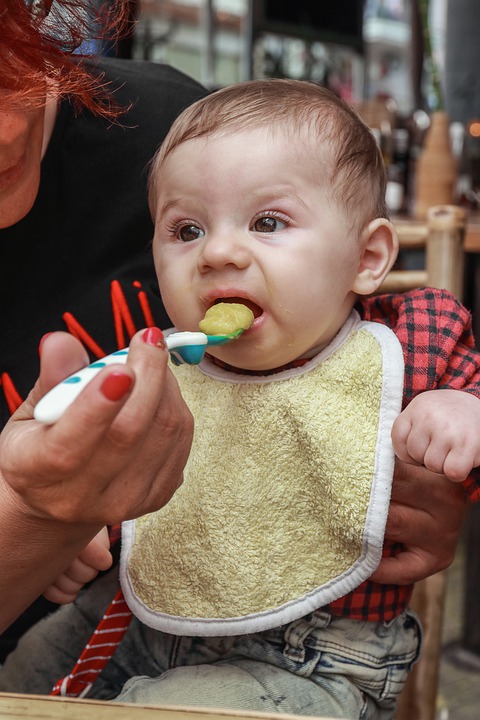
2. How do you make onion water for babies?
The preparation of onion water for babies includes boiling the onion in water, cooling it off, rinsing the onion from the water, and adding a teaspoon or two in the baby’s bottle.
3. Can I give onion juice to my baby?
Yes, giving a baby onion juice has been used as a home remedy to treat cough (17).
4. What does boiled onion water do to babies?
Although boiled onion water is thought to cure or manage colic in babies, there is no scientific evidence to support this statement.
Onion is a potent ingredient that can increase the palatability and nutritional value of a dish. In addition, onions act as an immunity booster and offer many other health benefits for babies. You can start feeding onions to babies from six months but do so in an age-appropriate manner. For example, begin by adding onion puree or mash to their food. However, consult your pediatrician before adding onions to your baby’s diet, especially if they are genetically allergic to foods belonging to the lily family.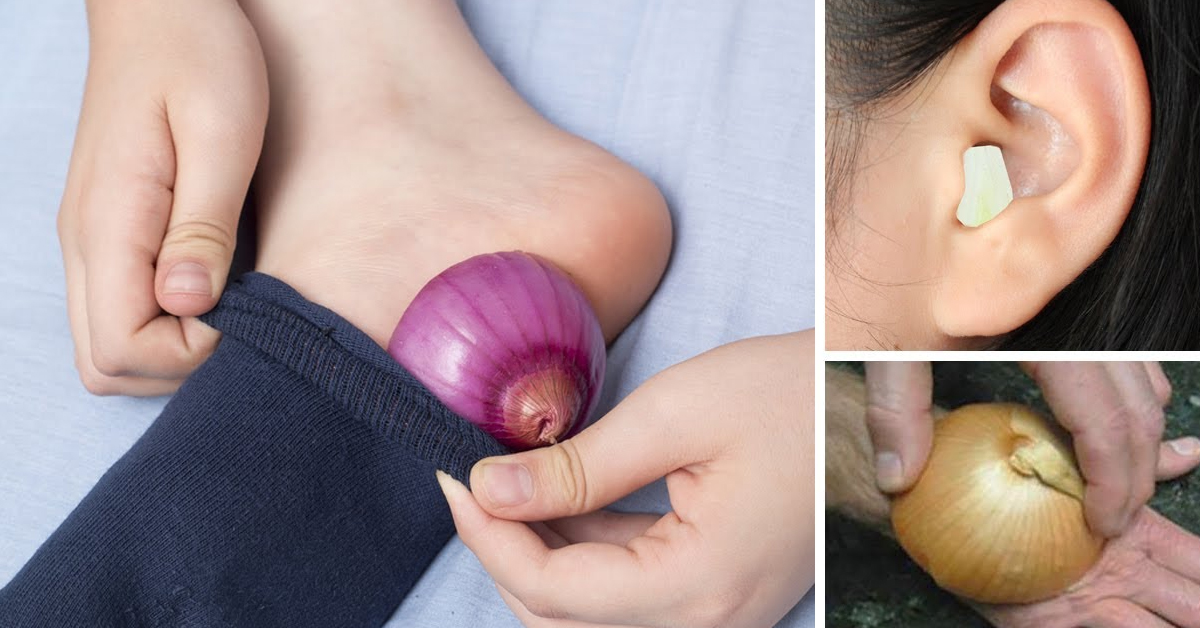
Key Pointers
- You may introduce onions to babies after six months in cooked or mashed forms along with other food items.
- Besides providing vital micronutrients, onions also promote immunity and improve gut and heart health.
- Add small quantities of onions in foods and gradually increase the quantity as per your baby’s preferences.
- Try different recipes with onions such as soups, sandwiches, and purees with various vegetables to feed your infant.
References:
MomJunction's articles are written after analyzing the research works of expert authors and institutions. Our references consist of resources established by authorities in their respective fields. You can learn more about the authenticity of the information we present in our editorial policy.
1. Onion Production; Penn State Extension
2. Onion; Louis Bonduelle Foundation
3. Nationwide Salmonella Outbreak Linked to Onions; Consumer Reports
4.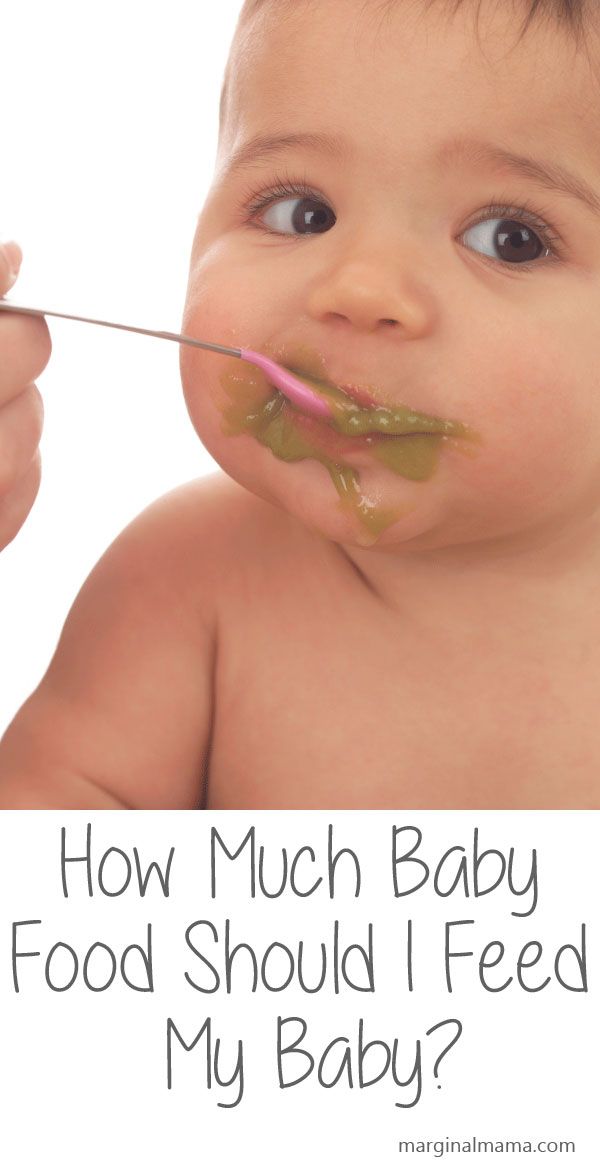 Onions, raw, FDC ID: 170000; Fooddata Central; USDA
Onions, raw, FDC ID: 170000; Fooddata Central; USDA
5. Feeding and nutrition of infants and young children; WHO
6. Folate; Oregon State University
7. Hafiz Ansar Rasul Suleria et al.; Onion: nature protection against physiological threats; NCBI
8. Yawen Zeng et al.; Therapeutic Role of Functional Components in Alliums for Preventive Chronic Disease in Human Being; NCBI
9. Gareth Griffiths et al.; Onions–a global benefit to health; NCBI’
10. Eat Right. Eat Color; Fanconi Anemia Research Fund
11. Food intolerance; Victorian Government
12. Exploring Aromatics; Eat Right; Academy of Nutrition and Dietetics
13. Know Your Onions: Peeling Powerful Nutrition Benefits; Tufts University
14. Onion; DermNet NZ
15. Onion and Garlic; Anaphylaxis Campaign
16. Renata Sõukand et al.; Use of cultivated plants and non-plant remedies for human and animal home-medication in Liubań district, Belarus; NCBI
17. Natural Remedies For Cold and Flu Handout 2020; Nutritious America LLC
Natural Remedies For Cold and Flu Handout 2020; Nutritious America LLC
The following two tabs change content below.
- Reviewer
- Author
Swati Patwal is a clinical nutritionist, a Certified Diabetes Educator (CDE) and a toddler mom with over eight years of experience in diverse fields of nutrition. She started her career as a CSR project coordinator for a healthy eating and active lifestyle project catering to school children. Then she worked as a nutrition faculty and clinical nutrition coach in different... more
Seeemaa Budhraja is a Delhi-based dietitian and nutritionist. She specializes in weight and lifestyle management. She is a healthy recipe designer, works as a health motivator and wellness coach as well. She has worked as a slimming head with one of the top organizations in India. She excels in therapeutic diets for various lifestyle-related diseases. This renowned nutritionist is a... more
Is It Safe To Eat Lotus Seeds (Makhana).
 .
.Is It Safe To Eat Lotus Seeds (Makhana)..
Dry Fruits During Pregnancy: Benefits,..
Dry Fruits During Pregnancy: Benefits,..
Spinach For Babies: Right Age, Benefits..
Spinach For Babies: Right Age, Benefits..
Cinnamon For Babies: Safety, Benefits..
Cinnamon For Babies: Safety, Benefits..
Is It Safe To Consume Cinnamon During..
Is It Safe To Consume Cinnamon During..
Top 10 Food Ideas For Your 16 Months..
Top 10 Food Ideas For Your 16 Months..
4 Possible Health Benefits Of..
4 Possible Health Benefits Of..
ORS for Babies: Dosage, Benefits And..
ORS for Babies: Dosage, Benefits And..
13 Excellent Benefits Of Avocados..
13 Excellent Benefits Of Avocados..
Bow for children. When | Nutrilak
08/03/2022 Reading time: 5 minutes 1417
Contents of the article
- Can children have onions?
- At what age should onions be given to a child?
- Is it worth giving green onions to a child
- The child does not eat onions.
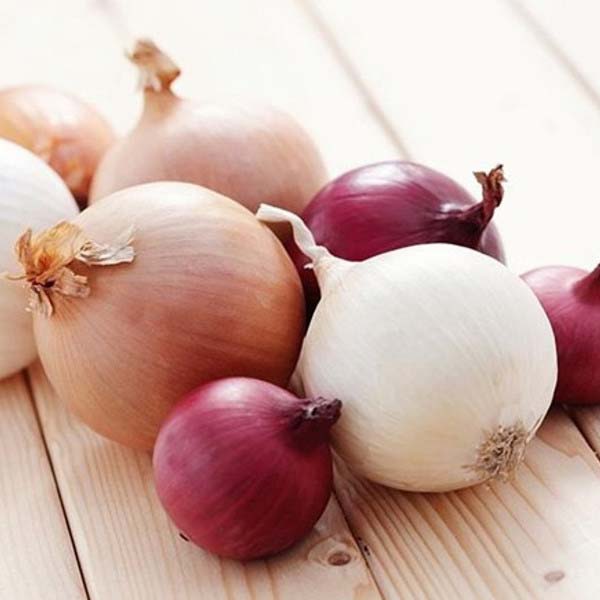 Should it be forced?
Should it be forced?
They heal with onions, they cry from onions. Someone loves onion soup, someone will not touch food until they pick out the smallest transparent pieces from it with a shudder. The onion is bitter, it has a pungent smell, few children immediately like it. And yet, without onions, the taste of your favorite dishes would not be the same.
Can children have onions?
Onion is useful for literally everything: it increases immunity, kills microbes, stimulates appetite, improves digestion and metabolism, strengthens the walls of blood vessels. A sharp-smelling bulb is both an antibiotic and a vitamin-mineral complex, in general, a real mini-pharmacy. Of course, such a healthy vegetable is necessary in the children's menu.
But, as with any product for children, questions arise at what age to give onions to a child, in what form and how much to offer. Let's try to answer them.
At what age should onions be given to a child?
If you can cook an independent dish consisting of one ingredient from zucchini, broccoli or potatoes, then spicy onions are used only as a seasoning to improve the taste. You can add it little by little in boiled form to soups and mashed potatoes for a child from 12 months after getting to know other vegetables, but do not forget to watch the reaction of the baby's body.
You can add it little by little in boiled form to soups and mashed potatoes for a child from 12 months after getting to know other vegetables, but do not forget to watch the reaction of the baby's body.
This is important!
Giving onions to a child under 12 months is not recommended.
Raw onions irritate the delicate mucous membrane of the digestive tract, so children are not recommended to give it before three years. However, if the child eats from the common table and eats a spoonful of salad with raw onions in the composition, it's okay. If the baby receives such a dish for the first time, make sure that the amount of the new product is small. Then a couple of days it will be useful to observe whether everything is in order with the baby's tummy. If there are no problems, then such microportions will not harm the child. The main thing is that the baby does not receive raw onions in large quantities every day.
Is it worth giving green onions to a child
In green onions, the concentration of nutrients is higher than in onions, especially greens, unlike onions, are not stored for a long time and do not have time to lose their properties.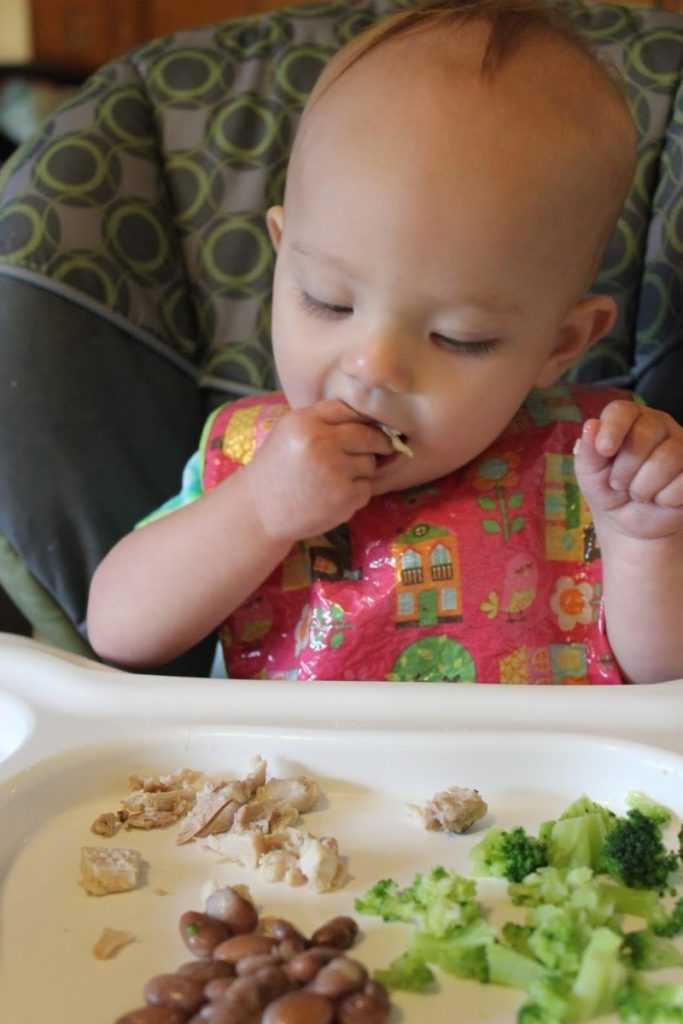 That is why green onions can be given to children. It serves as a valuable source of vitamins and minerals.
That is why green onions can be given to children. It serves as a valuable source of vitamins and minerals.
At first, like onions, green onions should be given to the child only after heat treatment, that is, added to soup or another hot dish.
This is important!
From about a year and a half, you can put a little finely chopped fresh green onion in dishes. When the baby learns to chew well without the risk of choking, you can offer him to nibble on thin young onion feathers or leave them on a plate in the baby’s field of vision and set an example.
The child does not eat onions. Should it be forced?
Only in a fairy tale, Pinocchio crunched a whole onion with appetite; in life, a baby rarely likes the pungent smell and bitter taste of this vegetable. If a child protests against onions in his plate, in no case should you force him. Food violence is just as much violence as any other, and it won't do you any good.
If the child refuses to eat onions, there are two ways to do it.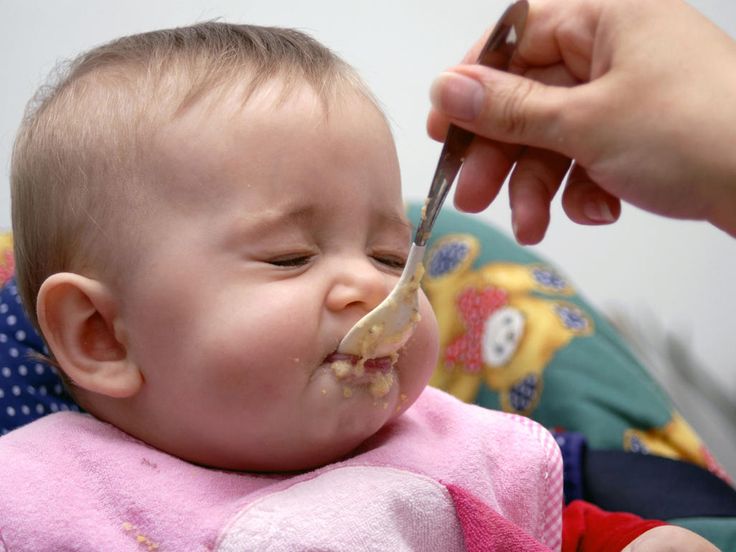 The first is not to insist that he eat this dish, and offer the onion meal later, after a few days. Sometimes it takes up to 10-15 attempts for a baby to accept a new product that he did not like at first.
The first is not to insist that he eat this dish, and offer the onion meal later, after a few days. Sometimes it takes up to 10-15 attempts for a baby to accept a new product that he did not like at first.
The second way is to give a bow to a child without seeing or feeling it. You can put a whole onion in the soup, and shortly before the end of cooking, throw it away. She will convey the taste, smell and some of the nutrients, but even the most attentive young detective will not find traces of onions in such a soup. You can just chop the onion very, very finely when cooking: in hot dishes it will boil and will not be visible, and in salads it will become less noticeable.
As a rule, the period of categorical rejection of most products passes with time. Sooner or later you will see that the child eats onions as if nothing had happened.
List
- Children can eat onions, they are good for health, although they are sharp in smell and taste.
- Boiled onions are given to a baby from 12 months, raw - from three years.
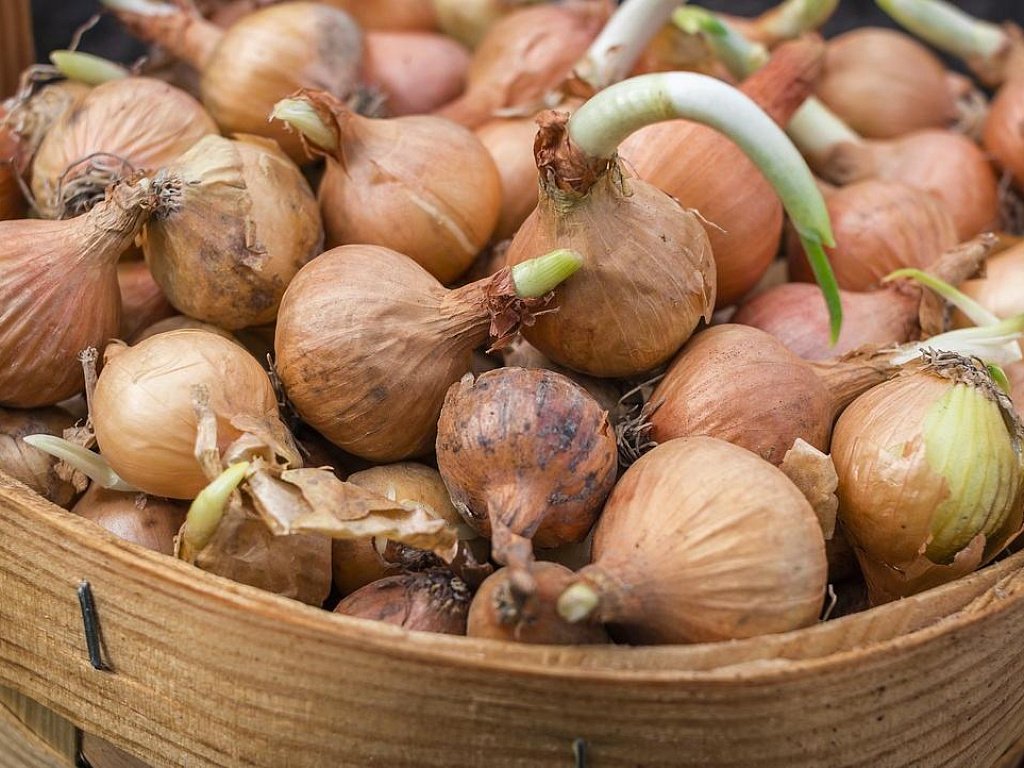
- Green onions should also be given to a child. Its feathers contain more nutrients than onions.
- It is not necessary to force a child to eat onions. You can either offer dishes with onions more than once, or make them less noticeable in dishes.
(0 ratings; article rating 0)
at what age can you give onions, benefits and harms
Back
At what age can you give onions to a child and how?
- The chemical composition of onions
- Benefits of onions for children
- At what age can onions be given
- How to properly give onions
- Remedies for ailments
- Cough remedy
- Help with runny nose
- Prophylactic
- Possible side effects and contraindications
- Garden
- Onion
- Benefit and harm
- At what age is it possible and how to give onions to a child?
27 likes
Probably, there are few people who do not know about the benefits of onions for the adult body. However, not everything that is useful for an adult will also have a good effect on a child. Today we’ll talk about how to properly give this vegetable to children, including infants.
However, not everything that is useful for an adult will also have a good effect on a child. Today we’ll talk about how to properly give this vegetable to children, including infants.
ShowHide
- Chemical composition of onions
- Benefits of onions for children
- At what age can onions be given
- How to give onions correctly
- Remedies for ailments
- Cough remedy
- Cold relief
- Prophylactic
- Possible side effects and contraindications
Onion chemistry
The positive effect of the product on the body is the result of the action of its components - vitamins, micro and macro elements.
Nutritional value per 100 g of product:
- calories - 41 kcal;
- proteins - 1.4 g;
- fats - 0.2 g;
- carbohydrates - 8.2 g;
- fiber - 20g
| Vitamins: | Micro and macro elements: |
|
|
In addition, onions contain small amounts of vitamins A, B2, B9, B7, K, as well as the trace element selenium, unsaturated fatty acids Omega-3 and Omega-6 . Although the calorie content of the vegetable is low and is less than 3% of the daily value, it contains 15% of the norm of dietary fiber, 11% of the norm of vitamin C, almost 17% satisfies the body's need for silicon, 50% for cobalt, 11% for magnesium.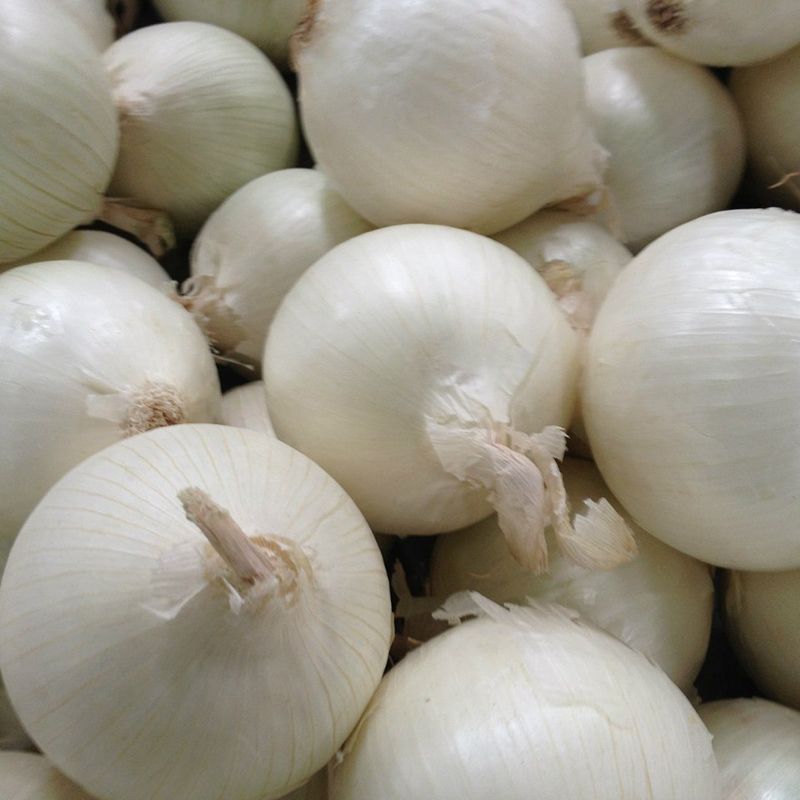
Benefits of onions for children
Onions, both onions and greens, are very useful for children.
- This vegetable:
- builds immunity;
- restores strength;
- improves the absorption of iron, which helps to normalize the level of hemoglobin in the blood;
- strengthens teeth;
- relieves nose and gum bleeding;
- stimulates metabolism;
- strengthens the bone and connective system;
- improves growth;
- contributes to the normal development of the reproductive system.
From what age can onions be given
The first acquaintance with onions should not occur before 7-8 months, and they should be given boiled. At this age, vegetables are introduced into complementary foods for babies, and during cooking, you need to add 1 small ring of green onions or a small cube of onions to them, carefully chopping everything when serving. In the absence of adverse reactions, a one-year-old child is allowed to add up to 10 g of this product to the vegetable mixture.
In the absence of adverse reactions, a one-year-old child is allowed to add up to 10 g of this product to the vegetable mixture.
Important! At the first introduction of onions into complementary foods, you should not introduce any other foods for the first time in order to know exactly what kind of reaction this vegetable will cause.
Do not use the raw onion in complementary foods, as it greatly irritates the delicate mucous membranes of the baby. You can add it to food no earlier than 3 years of age.
How to properly give onions
It is possible to talk about the benefits of onions only if they are given to children correctly, and for this you should:
- Make sure that the baby does not have diseases of the digestive system.
- Introduce the vegetable gradually, starting with tiny portions.
- Mix onions with other vegetables, cereals or meats.
- Do not give on an empty stomach.
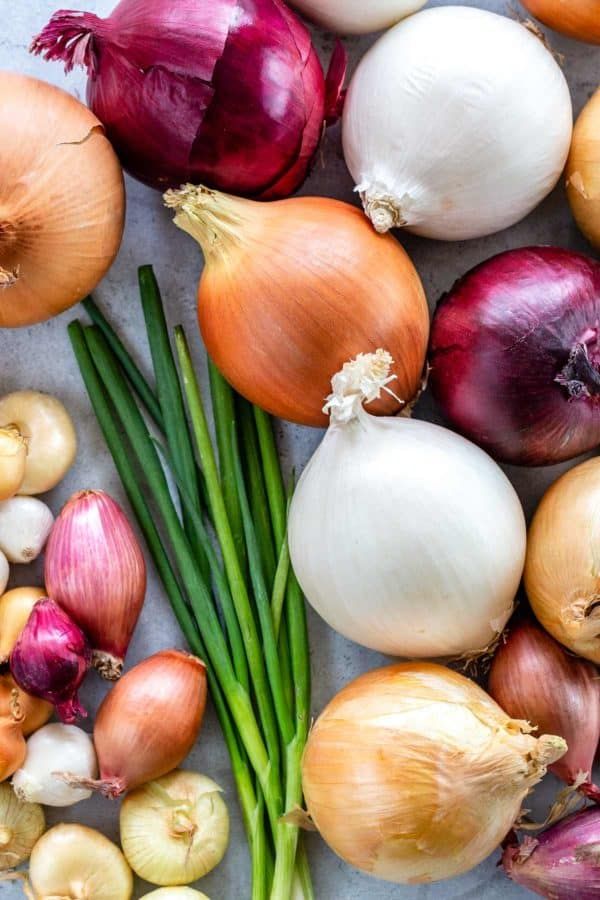
- Discard the vegetable if you have an allergic reaction or intestinal problems.
- Choose correctly, do not eat a spoiled product.
- Wash and clean bulb before use.
- Soak for 1 hour to get rid of stinging.
Medicines for ailments
- This vegetable is used for medicinal purposes:
- cough;
- for a cold;
- for the prevention of colds.
Cough remedy
To prepare cough medicine you need:
- Pass the onion, peeled and thoroughly washed, through a juicer, or finely grate with a grater or food processor.
- Wrap the grated vegetable in gauze to squeeze out the juice.
- Mix 1 teaspoon of the extracted juice with 1 teaspoon of honey.
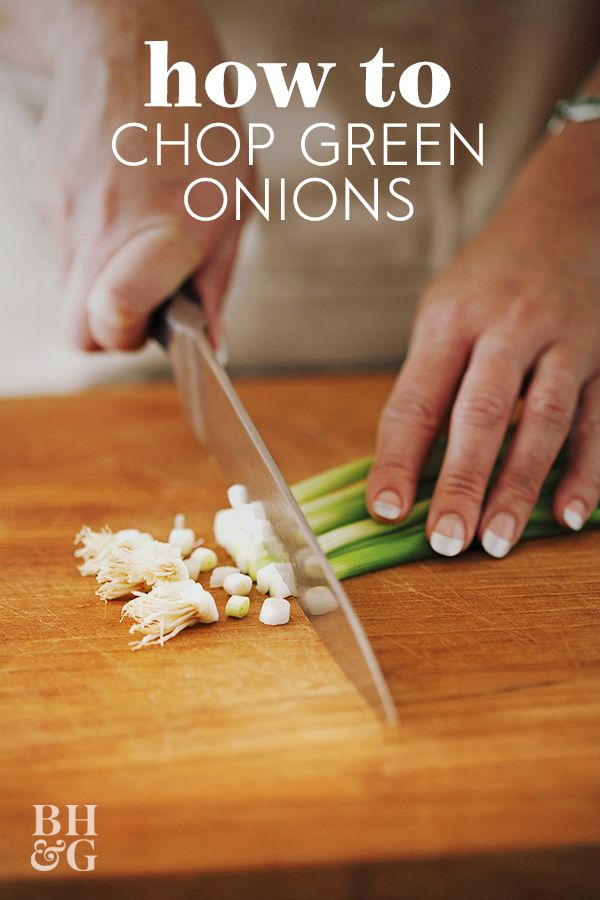
- Give to a child for 3-5 days 3 times a day: if he is 3-6 years old - 1 teaspoon, more than 7 - 1 tablespoon.
Important! All onion-based products should only be given to children after meals.
To reduce the likelihood of damage to the mucosa, the grated onion can be poured with a glass of boiling water, and after cooling, dilute the liquid with 1 teaspoon of honey. You can also use milk instead of water. Give the child such a drink before bedtime in a warm form: from 3 years old - 0.25 cups each, from 12 years old - 1 cup each.
If honey is contraindicated, you can add 2 tablespoons of sugar to a finely grated onion in the evening and leave until the morning. Give according to the scheme described for the remedy with honey.
Two-year-old children can be given a potion based on a boiled vegetable. First, the onion is boiled in sweet water, in a 1: 1 ratio of sugar and vegetable, then mashed and boiled again. The reception scheme remains the same.
The reception scheme remains the same.
Cold relief
Since the baby has a very delicate mucous membrane, it is better to refrain from dropping onion juice into the baby's nose, even when diluted. Instead, it is better to let the child breathe over the cut onion for 5 minutes, but only if he does not suffer from hypersensitivity to this smell.
Read more about how to use onions to treat a runny nose in children.
Prophylactic
For children of all ages, for the prevention of colds, you can spread onion pieces around the room and change them for fresh ones every 2 hours. To avoid headaches in your baby, do not leave onion slices too close to the crib.
Possible side effects and contraindications
- The use of fresh onions is contraindicated for children with such ailments:
- diseases of the digestive system;
- kidney diseases;
- bronchial asthma.


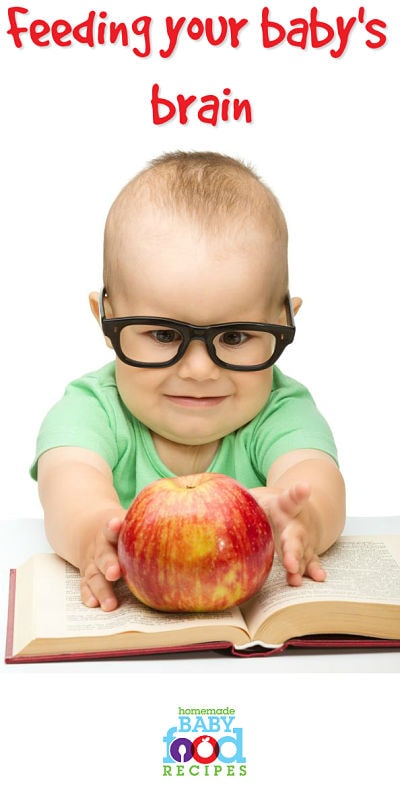 1 mg;
1 mg; 